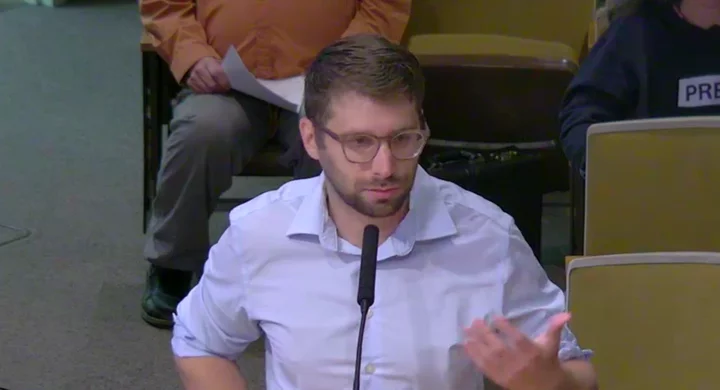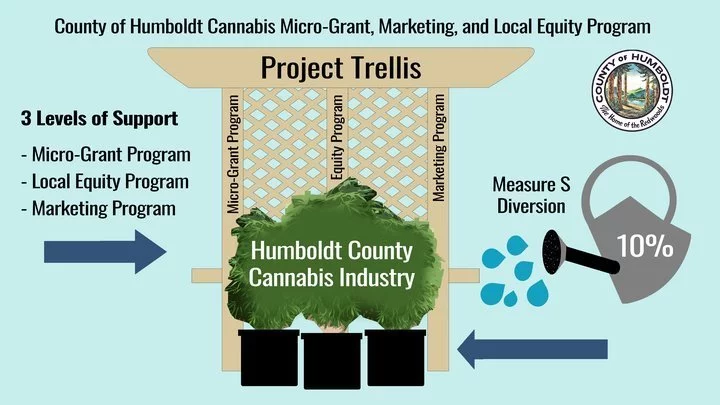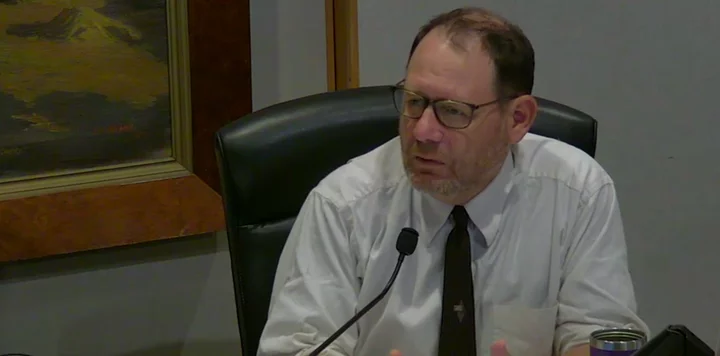Ross Gordon of the Humboldt County Growers Alliance at this morning’s meeting.
The Humboldt County Board of Supervisors today voted 4-0 to expand – a little bit — the types of grants available under the county’s “Project Trellis” program, which offers support to the cannabis industry. The county has some $600,000 in the kitty to give away this year, according to staff testimony – money kicked back to local government by the state, which collects state licensing fees on cannabis producers.
Supervisor Steve Madrone was absent.
Project Trellis, in its early days, was open for all sorts of projects that growers might wish to undertake. That changed on April 15th of this year, when the board voted to limit grants from the fund only to pay back taxes growers might owe to the county – specifically, property taxes and taxes due under the Measure S program. (Measure S has long been suspended, due to the general failure of the industry, but some growers still owe money from the early days of the tax.) In other words, the board voted to prioritize getting the county paid first.
An early concept graphic of Project Trellis, by the county’s economic development department. The money was to water the weed, which was to grow tall and strong on the trellis. It didn’t work exactly as expected.
Today, though, supervisors were asked whether they might want to loosen up the purse strings a bit, in response to “feedback that there is a potential need to consider other options for eligible expenses.” So staff presented the board with a couple of options, if it so chose:
- Option A: In addition to paying property taxes and Measure S taxes, Project Trellis can pay fees owed to the county’s Planning and Building Department.
- Option B: More or less a return to the status quo before April 15. In addition to the above, Project Trellis funds could pay for “rent; leases; local and state application, licensing and regulatory fees; legal assistance; regulatory compliance; testing of cannabis; furniture; fixtures and equipment; capital improvements; training and retention of qualified workforce; consulting fees: independent, regulatory, bookkeeping; start-up costs/financial solvency.”
Ross Gordon, policy specialist for the Humboldt County Growers’ Alliance, spoke in favor of Option B, and gave a few reasons. First, he noted that the purpose of the state funds flowing into Trellis was specifically for “equity” — to right past wrongs.
“The purpose of the equity funds from both the state and county level is to provide support to individuals who are impacted by the War on Drugs,” Gordon said. “If the decision from the board is to limit the use of those funds only to repaying county debts, it’s not really funds that are being distributed to people impacted by the War on Drugs.”
Gordon also noted that by limiting the use of Trellis funds only to pay back taxes, the county was effectively penalizing growers who had kept current. If you’ve already paid the county what you owe, you’re not eligible for this grant.
Supervisor Mike Wilson – a child of Southern Humboldt during the worst years of prohibition – pushed back a bit on the idea that Humboldt County growers had been historical victims of the War on Drugs. Had they not also been its beneficiaries?
“I mean, there is a basic construct that this wouldn’t even be an industry had there not been a War on Drugs, at least not in this space,” Wilson said. “And the investment in the infrastructure and the businesses that all occurred due to the elevated prices because of the War on Drugs — it was double-edged, I guess you would say. So a lot of people wouldn’t have had the opportunity to own land and all the other things that come with this had there not been this price structure that was created because of the legal status of the product.”
Wilson.
But that was more or less an aside. His main question was about how much more staff time would have to be devoted to grant compliance, were the board to go the route of Option B. It’s a lot harder to check whether grant money is being spent appropriately when it can go to any of a long list of private sector suppliers; much easier when its just a simple check written out to a governmental agency.
When it was her turn to speak, Supervisor Michelle Bushnell hit upon a happy compromise that seemed to answer both Gordon’s and Wilson’s concerns. While she herself supported Option B, she said, perhaps the board could modify Option A such that grant funds could be used to pay a grower’s state licensing fees. All licensed growers have to pay these fees every year, whether they are current with their county taxes or not, so all licensed growers can apply.
After a bit more discussion, it became apparent that this was acceptable to everyone, including the growers in the audience and county staff, and so Bushnell made a motion to that effect. It passed unanimously.



CLICK TO MANAGE